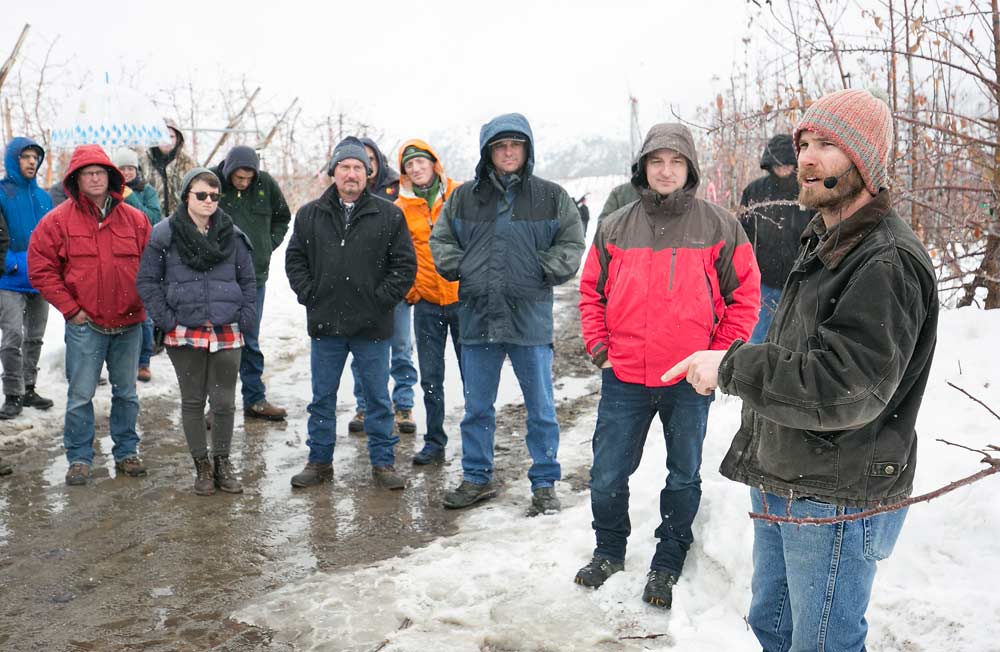
Jake Robison talks about succession planning and transitioning to new varieties during the International Fruit Tree Association tour at his family’s Chelan, Washington, orchards in February. (TJ Mullinax/Good Fruit Grower)
Four and a half years ago, Jake Robison returned to the family orchards in Chelan, Washington, after a stint in the U.S. Army.
Today, at 27, he’s working toward gradually taking over the 125-acre farm of apples, pears and cherries.
The Robison family set out on the path of succession planning after Jake returned home. Now three years into a roughly 10-year plan, Jake continues to learn from his dad, Dave, whose retirement is scheduled seven years out.
“Dad is still the boss, making all the decisions,” Jake Robison told growers in February when the International Fruit Tree Association stopped by the Robisons’ orchards during the 60th annual conference and study tours. “I’m just getting enough experience to weigh in on the decisions. We work well together, and that’s key to our relationship.”
Overall, he said, the family had three goals in mind when beginning the process of success planning:
—Take care of the older generation through retirement and ensure they’re comfortable.
—Maintain good relationships with siblings who are not associated with the farm, which can be an “awkward subject,” Jake said. He is the youngest of four children and the only one currently interested in working on the farm.
—Ensure the viability of the business into the future.
“Using that, we were able to establish a timeline, based on what they want out of retirement,” he said. “If you just write into the will and say it’ll be yours someday, that could cause some problems.”
To meet the first two goals, the family worked with legal and financial advisers, including Farm Credit Services. The door remains open for his siblings to join the farm, though Jake said all are well established and unlikely to change their minds.
Even as a fourth-generation grower, Jake Robison recognizes that he’s still learning. Pointing to one block, he said.
“Three years ago, my dad said, ‘You start making all the decisions here.’ After a while of that, I realized I should be asking more questions,” he said, laughing. “We’re only two years in. I’m sure we’ve got some roadblocks coming, and we’ll see how it goes.”
A similar story
Maurice “Mo” Tougas, a former IFTA president and direct-market grower in Northborough, Massachusetts, about 45 minutes from Boston, is a bit further down the succession path with his son Andre. Andre Tougas returned to the farm more than a decade ago and first bought into it in 2006.
Mo Tougas liked what Jake Robison had to say at the tour. Like the Robisons, the Tougas family met with consultants, who advised forming an LLC and trusts as they gradually transferred responsibilities, business operations and the property to the next generation.
But longtime growers need to recognize the transition goes beyond finances, he said.
“The financial part is less intimidating than the emotional part. (Andre’s) earned his way into ownership through sweat equity, but it’s more about my letting go that’s probably more difficult than the financial part,” Tougas said. “It’s just more about my ability, after 35, 40 years, to let go and let him take over responsibility and authority.”
How difficult has it been? “Painstaking,” he said with a laugh.
As expected, there were days they struggled, he said — days where Andre would make a decision and Mo might think it’s the wrong way to go. But, he said he realized he had the opportunity to make his own mistakes. “And I’m here to back him up,” he said. “Overall, it’s been great.”
Today, Andre is in charge of ordering trees, handling paperwork for guest workers, while Mo gets to mow and spray — the very things that drew him to farming in the beginning.
His advice: Don’t be afraid to spend money and hire experienced consultants to work with you through the process, and do so early in the process. “It takes a lot longer than you think,” he said. “We’ve already gone through 10 years of a 10-year plan.”
There’s still some transfer of ownership to take place. One of two daughters also works on the retail side of the farm, and her fiance is also interested. Mo’s wife also still handles bookkeeping, which is a task that will need to be handed over to someone.
“I think that would be great, everybody having a role, but well understood that when my wife and I retire, Andre is going to be in charge,” he said. “That kind of stuff is going to have to work out with the rest of the family, but it’s stuff that’s been talked about, right from day one.”
Staying viable
For the Robisons, meeting the third goal of their farm succession plan was imperative — ensuring the long-term viability of the business. To meet it, the family has decided to transition more and more to higher-value varieties.
The family farms on hillsides and acreage that is divided and spread out across a wide area. The largest block is 8.5 acres, with the smallest at just an acre.
“We’d have to compete in efficiencies on low-value varieties,” Jake Robison said. “We can’t compete with a 100-acre block that’s flat. That’s the reality.”
The goal instead: to grow 75 percent high-value varieties. “In doing that, we can stay in business. We can stay competitive. As a small company we saw it as an opportunity,” he said.
That started with Honeycrisp, then Jazz, which opened the door for Envy, another Enza club variety. Robison said he’s excited about another variety, Sugarbee — they planted more than 10 acres in two blocks in 2016 — but doesn’t know how easy it will be to grow yet.
“We’re moving as fast as possible with the high-value stuff. About 30 to 35 percent of our orchards are out of production now during the transition. That’s created some problems in terms of cash flow,” Robison said with a laugh, “but we believe in it.” •
– by Shannon Dininny






Leave A Comment